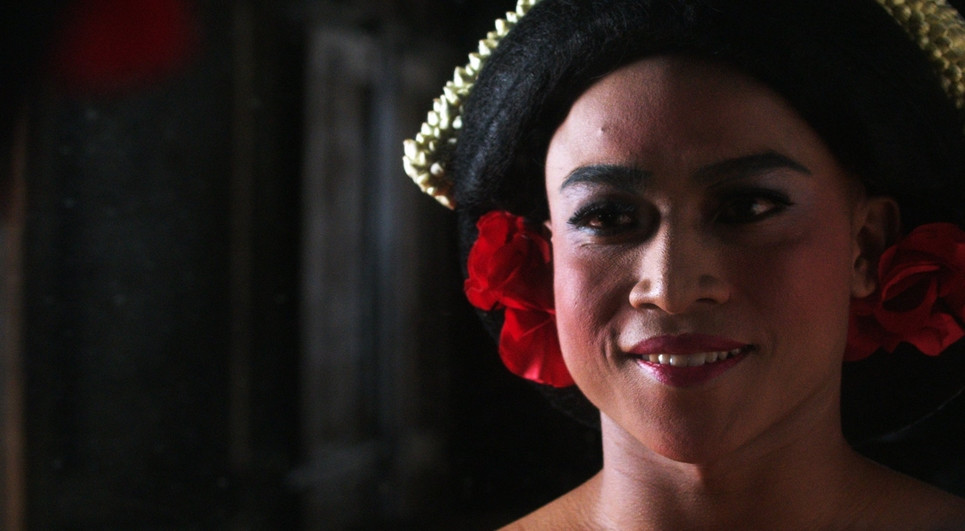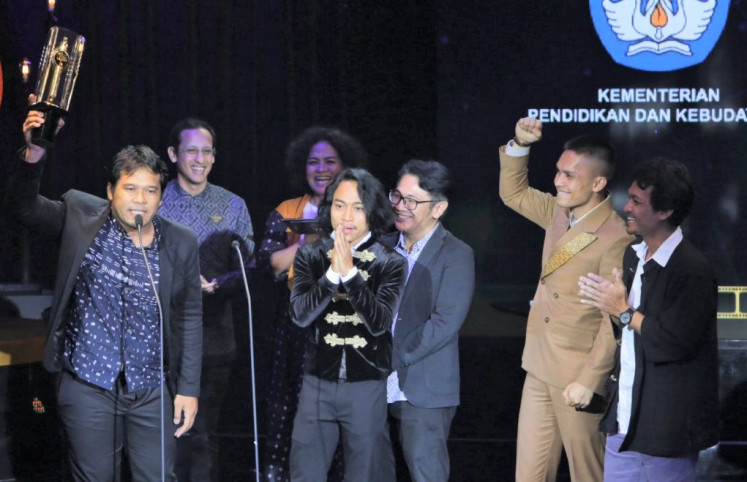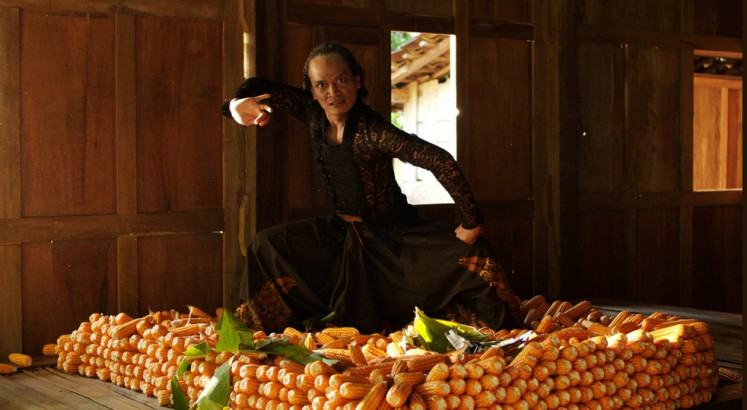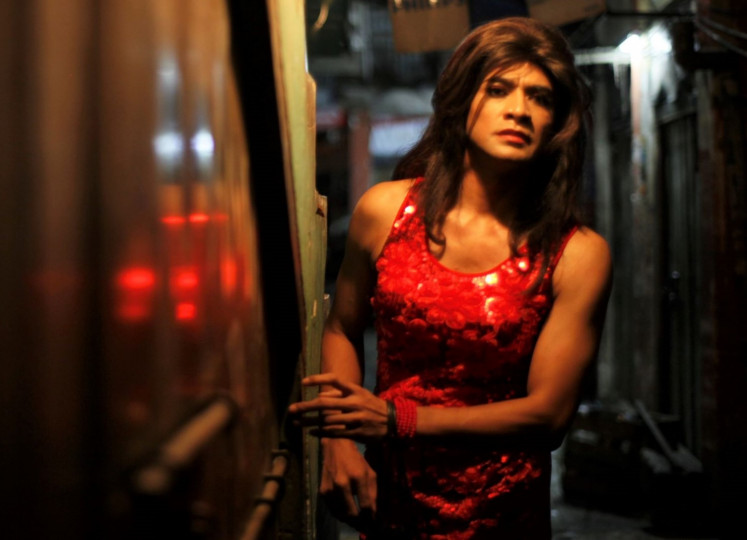Popular Reads
Top Results
Can't find what you're looking for?
View all search resultsPopular Reads
Top Results
Can't find what you're looking for?
View all search results‘Lengger’: Cultural and gender identities in the Indonesian tradition
Discussions of gender identity and sexuality are not generally widespread in contemporary Indonesia.
Change text size
Gift Premium Articles
to Anyone
T
he rise of social conservatism has certainly affected public perceptions of issues that are considered to be “deviant” from the norm.
Take, for example, Garin Nugroho’s film Kucumbu Tubuh Indahku (Memories of My Body), which explores the life of a traditional Javanese dancer named Juno.
Despite winning eight of its 12 nominations at the 2019 Indonesian Film Festival awards and becoming the Indonesian entry for the 2020 Academy Awards in the Best Foreign Language Film category, Kucumbu was subject to controversy at home because of its perceived homoerotic nature, with several cities banning theater screenings altogether.
Big win: Producer Ifa Isfansyah (left) receives the Citra Award for Best Feature Film at the 2019 Festival Film Indonesia Awards for the film 'Kucumbu Tubuh Indahku' (Memories of My Body). The film won eight of the 12 awards it was nominated for at the festival. (JP/Wendra Ajistyatama)
In an online seminar hosted by Philadelphia-based Indonesian dance company Modero, Garin said the movie was born from a collaboration with dancer Rianto after he visited his hometown of Banyumas in Central Java, the birthplace of the traditional cross-gender dance lengger.
“We always discussed masculinity and femininity. [...] The choreography came from Rianto, but the film – the concept – is from me, which took inspiration from his life,” he said, adding that the film explored the intersection between gender, culture and art in Indonesia.
In the lengger dance, it is believed that indang (spirits) enter the bodies of the dancers. The dancers themselves are men dressed as women.
Possessed: The dance highlighted in the movie is 'lengger', where dancers are men dressed as women and believed to be possessed by 'indang' (spirits) during the performance. (Courtesy of Fourcolours Films/-)The term lengger is the shortened form of the Javanese phrase diarani leng jebule jengger, which roughly translates to “thought to be a woman, turned out to be a man”.
The late dancer Dariah could be considered an icon of lengger. She received an award from then-President Susilo Bambang Yudhoyono in 2011. Born as Sadam, Dariah lived as a woman until passing away at the age of 97 in 2018.
Rianto, who plays the adult Juno as well as the narrator in Kucumbu, said that as a lengger dancer himself, he never thought of his gender.
“In my dance, it’s on and off in my body – the femininity and masculinity in my body – so if I thought about myself as a man or a woman [in the dance], it wouldn’t be fair to myself. Instead, I am a human, a body to continue living, because what I do is for ibadah [prayer].”
Rianto is now an established dancer with his own dance studio in Tokyo, teaching gamelan traditional orchestra and performing Javanese dances.
Dede Oetomo, a LGBT rights campaigner and the founder of GAYa Nusantara, noted that other cultures in Indonesia beside the Javanese lengger also had transgender customs.
He highlighted the Bugis people of South Sulawesi, who traditionally recognize five genders, including bissu – a gender-neutral identity considered a sacred spiritual figure.
In the Bugis creation myth epic La Galigo, which narrates the origins of the Bugis tribe in South Sulawesi from the 13th to 15th centuries, Dede said the first two humans who descended to earth were accompanied by 28 bissu.
“Even in Aceh – of course the Acehnese will not recognize this anymore – if you read the old classical Aceh manuscripts, there are actually relationships between men. These days in Aceh, they will be whipped,” Dede said.
Indonesia, he said, had forgotten its roots, with Indonesian culture copying the West at its worst, when, meanwhile, the West had woken up to gender identities beyond the male-female binary. Indonesia was becoming like the “old” Westerners in attitude, exacerbated by politicians and religious leaders.
Garin found that attitudes about LGBT issues had shifted, though censorship often came from parts of society, such as radical religious groups, which he considered among the biggest problems in the country.
Despite these attitudes, LGBT-related films have always been a part of Indonesian cinema, such as the 2011 drama Lovely Man, the 2010 superhero comedy Madame X or even the 1978 comedy Betty Bencong Slebor as played by the late Benyamin Sueb in drag.
Award-winning role: Actor Donny Damara stars as a transvestite working on the streets of Jakarta in the 2011 movie 'Lovely Man'. (Courtesy of Karuna Pictures/-)While the controversy surrounding Kucumbu was notable, Garin said there were many communities interested in screening the film, including Muslim communities.
“The importance of this film is that the LGBT [identity] is part of humanity and everyday life. The second point is that young people experiencing pop culture can understand the history of gender in this country. They ask many questions about reog [traditional dance] and lengger,” he said.
Garin said the film acted as a new reference for learning about history and culture, as shown by the Cultural Diversity Award it received under the Patronage of UNESCO at the 2018 Asia Pacific Screen Awards.
As for the lengger community, Rianto said they were pleased that the art had been highlighted and brought to public attention.
“Many lengger dancers, after performing, return to their homes as a masculine person. Many people do not know about the personal lives of lengger dancers, but in this movie, it very much reflects their simple lives in the village,” he said. (ste)













